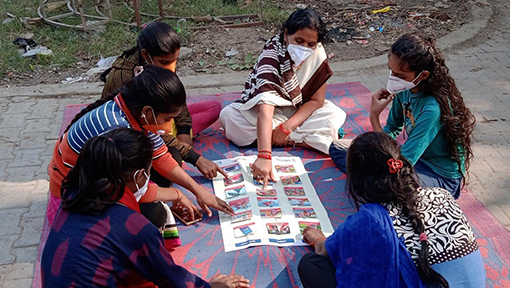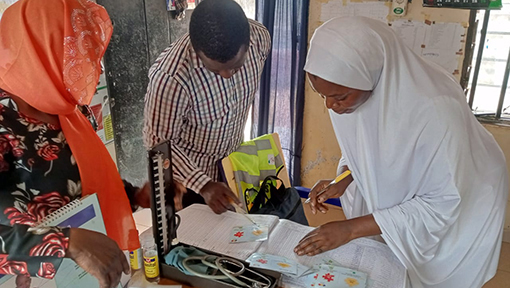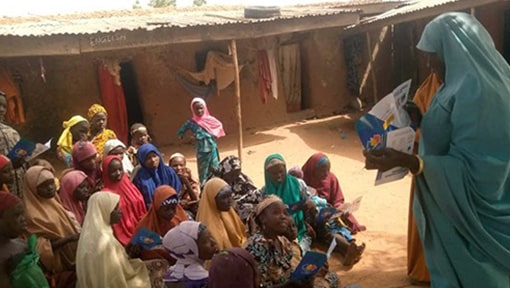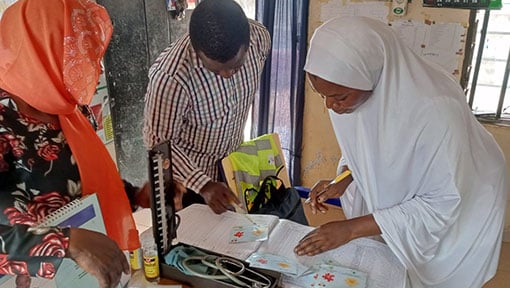Youth-Led Workshops Engage Youth in the Design of AYSRH Programming in Uttar Pradesh
Contributors: Ipsha Singh, Devika Varghese, Nivedita Shahi and Deepti Mathur

Photographer: Kewal Singh Sisodiya
The Challenge Initiative for Healthy Cities’ (TCIHC’s) state-level advocacy efforts successfully convinced the General Manager of Rashtriya Kishor Swasthya Karyakram (RKSK) – the government of India’s adolescent health program – of the critical importance of meaningfully engaging youth in policy and strategy development that aims to work for them.
As a result, TCIHC held youth-led city consultation workshops in three Uttar Pradesh (UP) cities, including Lucknow. This was the first time that a workshop brought together adolescents to partner with government stakeholders – including the Chief Medical Officer, state General Manager for RKSK, and other key decision-makers and health leaders from all departments – to devise an adolescent and youth sexual and reproductive health (AYSRH) strategy. Lucknow city leaders acknowledged they had not realized how great the demand was for sexual and reproductive health information and services by adolescents and youth.
Prior to this workshop, the contraceptive needs of adolescents and youth went unheard, unregistered and unrealized. The following eye-opening comments were shared during a recent youth-led city consultation workshop in Lucknow.
Amisha Gulati, a 19-year-old girl from Lucknow, said:
If we ask our elders anything related to our body changes, they get annoyed and give dissatisfactory answers. Our teachers also skip the chapters related to reproductive health and tell us to read these chapters at home. I don’t understand as every girl undergoes these changes. They have many doubts, myths and taboos related to menstruation, physical changes, pregnancy, etc. Girls must have correct information about all these before getting married so that they can take care of themselves and their family, but it does not happen!”
Pankaj Mishra is a 17-year-old boy and added this to what Amisha shared:
Boys joke about these issues and never take them seriously. Teachers and parents do not talk about puberty, menstruation, masturbation, etc. ever with us. We also hesitate in asking them anything related to these matters. Actually, the whole environment is not adolescent friendly. It would be great to have a counsellor who keeps our discussions confidential and gives correct knowledge.”
The medical officer of Lucknow, Dr. Shalini Verma, agreed that the situation has been problematic, saying:
Adolescents do have lots of questions, but they are unable to discuss these with their elders. Moreover, they are subjected to immense pressure from parents on academic excellence and the objective of a career. Sexual and reproductive health issues add to their stress, as their questions and needs remain unanswered.”
During the Lucknow workshop, government stakeholders worked in partnership with adolescents and youth to identify gaps and solutions and develop not only an AYSRH strategy but also an action plan to serve better serve the needs of adolescents and youth. The final action plan includes the following decisions:
- Special Fixed Day Static (FDS) service every month for first-time parents at the urban primary health center (UPHC) level
- Whole-site orientation for UPHC staff at the UPHC level
- One day per month fixed at UPHCs for an adolescent health day
- Convergence among different departments and engaging RKSK team and adolescents and youth in regular City Coordination Committee (CCC) meetings
- Representation of each department in city-level review meetings and RKSK planning meetings
Other TCIHC-supported cities in Uttar Pradesh have now requested similar support to hold their own youth-led consultation workshops. Consequently, all 10 TCIHC AYSRH scale-up cities have successfully organized these workshops with the support of National Health Mission budget and TCIHC coaching and technical assistance.
Seven of the 10 cities demonstrated their political commitment to youth engagement in carrying out their workshops virtually as a result of the COVID-19 lockdown. TCIHC’s coaching of nodal officers, especially the urban family planning and RKSK ones, helped them to plan, organize and manage the virtual workshops.






